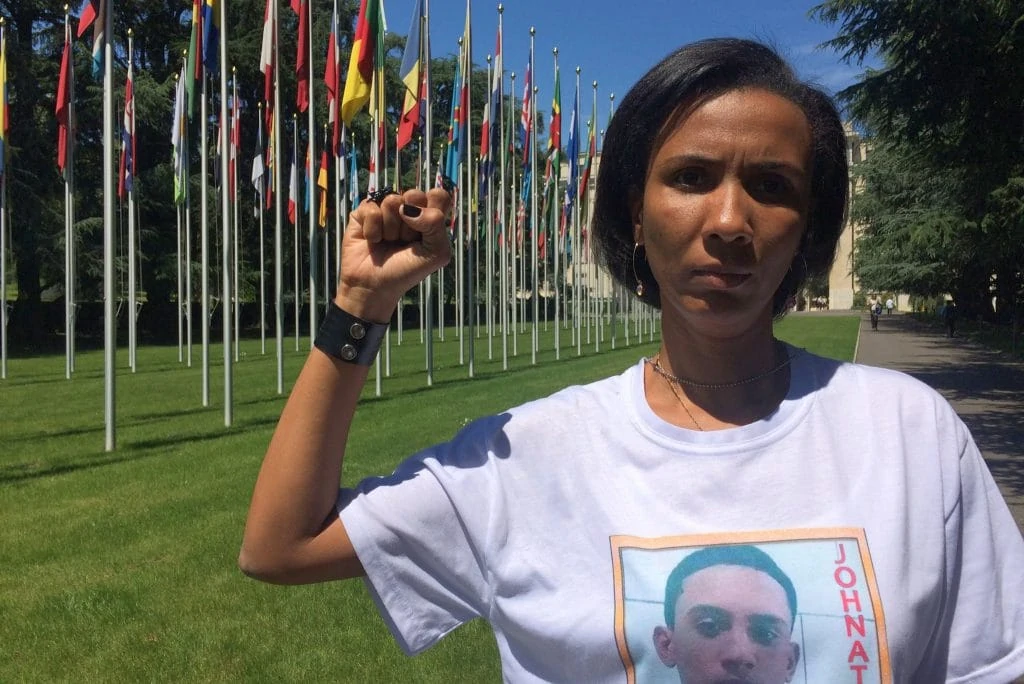Manguinhos is just one of many communities in Rio de Janeiro affected by evictions, police violence and human rights violations. And this in the name of major sporting events. One of the victims who is fighting against this is Ana Paula Gomes de Oliveira. In a short conversation, she reported on the suffering that she and her family have experienced.
Ana Paula Gomes de Oliveira, has lived in Manguinhos in the north of Rio since her birth. She was not only the victim of forced evictions, but also lost her son due to police violence. At the end of June 2016, she was invited by the UN and the IOC to report on the situation in the favelas of Rio and especially on her own history as a representative of the affected population. When she was a guest in Geneva, we spoke to her.
As a resident of Manguinhos, you have also been the victim of forced evictions. Were you surprised by the evictions?
Ana Paula Gomes de Oliveira: Until 2010 we were not afraid of forced evictions. My family was one of the few who could buy a house in another part of Manguinhos with the financial compensation. Nevertheless, these evictions caused my family a lot of suffering.
What suffering has befallen them?
Seven months after the eviction, my 19-year-old son Jonathan was killed by the police with a shot in the back.
What exactly happened?
On the afternoon of 14 May 2014, he was on his way back from his girlfriend's house when he encountered a verbal incident between the police and the population. There were many people on the scene. The police began firing warning shots in the air. As a result, people began to flee from the police. But there was another policeman who shot at the crowd while they were fleeing. He hit Jonathan in the back. My son bled to death on the way to the hospital.
Has this police officer been brought to justice?
It was outrageous when I later heard that this policeman was still on duty. This police officer is under investigation for murder in three cases and attempted murder in two cases. When I learned of this, I tried to convince the state human rights commissioner that this policeman should at least be transferred. Which is what happened later.
Jonathan is not an isolated incident.
Since Jonatha, eight boys have been killed in our church alone. They have been shot, beaten to death or succumbed to injuries from a stun gun. People in the community know each other well. It's painful for everyone. We weren't even over the killing of my son when it went on.
Has it always been like this?
The relationship between the police and the population has always been marked by violence. It has been as bad as it is now since the start of the government's urbanisation programme. Since then, the government has been trying to "pacify" the favelas with a heavily armed police unit. On paper it is about police work, but in reality it means a militarization of the police.
And what is the reason for all this violence?
Racism is very strong in Brazil. If you look at the number of people killed by the police in the favelas, the number of young black people is very high. Besides, black people don't have the same chances. Since they don't have a good education, they can achieve little.
Young black people like her son. What kind of man was he?
Jonathan was a kind and popular boy. He liked to go out. He loved music and dancing. He had a steady girlfriend and they were thinking of getting engaged. He was going to be a military man and a parachutist.
They have lost their home and their son. Where do you get the strength for your political commitment?
It comes from love for my son. It comes from the hope that one day mothers will have the right to live with their sons.
Where are they politically active?
When Jonathan was killed, I received a lot of support from a local movement. I became a part of this group and they still support me in my fight against police violence. As a movement, we always contact the families after such a loss and also help to mobilise for protests.
What does it mean for them to be here in Geneva and to be allowed to speak before the IOC/UN? What will you tell people?
For me the opportunity to be here represents a great victory. It is also a great responsibility because I represent thousands of Brazilian mothers who have lost their sons in police killings. For us people from the favelas it is a chance to give the dead a voice. We are tired of mourning our dead and we want it to stop.
What does it mean to you when international organisations like Terre des Hommes support them?
It is very important to have this support, because in Brazil the violations of the right to life have become everyday, normal. Perhaps the international public can help to break this indifference.
What can people in Switzerland do? Is it enough to show solidarity?
It is very important that people talk about these incidents and acknowledge that these problems exist. The Olympic Games have led to more deaths. The authorities want to show the beautiful Rio and therefore try to hide us.
Will you still be able to enjoy the games or do you wish that everything is over as quickly as possible?
Unfortunately, I won't have much time to think about the games, because I'll have to focus entirely on the safety of my family and friends. During the World Cup the number of people arrested and killed by the police increased. That is why we are afraid that the legacy of the Olympics for the poor people will be blood, suffering and tears.


